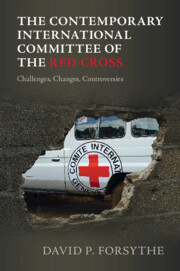Book contents
- The Contemporary International Committee of the Red Cross
- The Contemporary International Committee of the Red Cross
- Copyright page
- Dedication
- Contents
- Photographs
- Preface: Who and Why
- 1 The Contemporary ICRC and Its Critics
- 2 The ICRC and the Global Humanitarian System
- 3 History
- 4 History
- 5 The Red Cross Movement
- 6 The Red Cross Movement
- 7 ICRC Relations with Bern
- 8 ICRC Relations with Bern
- 9 Humanitarians and Business
- 10 Humanitarians and Business
- 11 Interpreting the Mandate
- 12 Interpreting the Mandate
- 13 Has the Traditional Focus Been Lost?
- 14 Has the Traditional Focus Been Lost?
- 15 ICRC Governance and Management
- 16 ICRC Governance and Management
- 17 Conclusion
- 18 Conclusion
- Epilogue
- Annex
- Index
Epilogue
The War in Ukraine – Challenges and Controversies
Published online by Cambridge University Press: 01 February 2024
- The Contemporary International Committee of the Red Cross
- The Contemporary International Committee of the Red Cross
- Copyright page
- Dedication
- Contents
- Photographs
- Preface: Who and Why
- 1 The Contemporary ICRC and Its Critics
- 2 The ICRC and the Global Humanitarian System
- 3 History
- 4 History
- 5 The Red Cross Movement
- 6 The Red Cross Movement
- 7 ICRC Relations with Bern
- 8 ICRC Relations with Bern
- 9 Humanitarians and Business
- 10 Humanitarians and Business
- 11 Interpreting the Mandate
- 12 Interpreting the Mandate
- 13 Has the Traditional Focus Been Lost?
- 14 Has the Traditional Focus Been Lost?
- 15 ICRC Governance and Management
- 16 ICRC Governance and Management
- 17 Conclusion
- 18 Conclusion
- Epilogue
- Annex
- Index
Summary
The book closes with some early observations about the international armed conflict between Russia and Ukraine, from February 2022 until summer 2023 when this book was finalized. The Epilogue focuses on civilian Protection, prisoners of war, and ICRC communications policy. This approach allows one to begin to understand the complexities and difficult decisions facing the organization. The author’s necessarily tentative observations note, for example, the difficulties of getting ICRC activities properly underway, the sizable civilian assistance and protection provided, the grave difficulties involved in trying to get proper access to prisoners of war on both sides, and the debate surrounding the ICRC communications policy – which was much more open about civilian dangers and destruction than about the status of diplomacy for prisoners of war (not to mention interned and restricted Ukrainian civilians on the Russian side). As the book was going to press, the ICRC had major reputational problems in Kyiv despite its great effort to aid Ukrainian civilians severely affected by the fighting. And despite many bridge-building efforts in the past, it faced Russian policymakers whose priorities clearly did not include great attention to the rules of IHL, as had been true of Russian actions in the Syrian internal war and violent unrest in the Russian area of Chechnya – not to mention controversial Russian mercenary action in the Sahel. Despite over 150 years of persistent ICRC efforts, it was evident that in general the laws of war remained a fragile restraint on armed conflict and other major violence.
Keywords
- Type
- Chapter
- Information
- The Contemporary International Committee of the Red CrossChallenges, Changes, Controversies, pp. 409 - 437Publisher: Cambridge University PressPrint publication year: 2024

